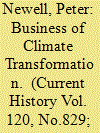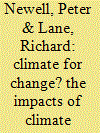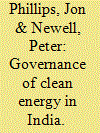|
|
|
Sort Order |
|
|
|
Items / Page
|
|
|
|
|
|
|
| Srl | Item |
| 1 |
ID:
078989


|
|
|
|
|
| Publication |
2007.
|
| Summary/Abstract |
How far can Corporate Social Responsibility (csr) initiatives help to address poverty, social exclusion and other development challenges? What is the balance of responsibilities between state, market and civil society in addressing these problems and meeting the UN Millennium Development Goals (mdgs)? What new tools, strategies and methodologies are required to harness the positive potential contribution of business to development and deter corporate irresponsibility? This special issue brings together a dynamic mix of academics and development specialists to address these themes in a focused and innovative way. In this introductory article, we consider some of the key cross-cutting themes and insights raised by the contributions. The aim of the introduction and the special issue is to start to fill the gap in our understanding of how, when and through what means business can help to reduce poverty, while recognising the equally powerful potential of the business community to exacerbate poverty. Taking particular csr initiatives as a starting point, we seek to look at the broader developmental footprint of business-as-usual strategies, as well as those which fall under the banner of csr, to gain a fuller picture of how business is implicated in the development process.
|
|
|
|
|
|
|
|
|
|
|
|
|
|
|
|
| 2 |
ID:
181527


|
|
|
|
|
| Summary/Abstract |
Without deep transformations in the economy that go beyond incremental gains in decarbonization, we remain on course for catastrophic global heating. Some businesses have pledged to go carbon-neutral, carbon-trading schemes are expanding, and a growing divestment movement has pressured investment funds to shun fossil fuel producers. But financial forces are also part of the problem, still driving more production and consumption of fossil fuels. Achieving transformational shifts in finance, production, and governance calls for a more disruptive politics underpinned by shifts in power relations.
|
|
|
|
|
|
|
|
|
|
|
|
|
|
|
|
| 3 |
ID:
174083


|
|
|
|
|
| Summary/Abstract |
The geophysical phenomena of climate change impact on the existing organization of energy economies and their attendant politics in multiple ways—at times magnifying and at other times dampening pressures on contemporary energy systems. Climate change has been increasingly viewed as a 'threat multiplier'. However, the geophysical phenomena of climate change are socially and politically mediated by actors with uneven power, capacity and divergent interests in order to support either incumbent or alternative energy pathways. While climate change intensifies and magnifies existing tensions and contradictions in global energy politics around the simultaneous pursuit of growth, security and sustainability, it does not do so in any straightforward or unmediated way. Instead, it gives rise to new concerns in relation to the imperatives of de-carbonization and increasing the resilience of energy systems. Understanding the impact of climate change on energy systems requires taking seriously the necessary role of energy within the global political economy and the relationship between fossil fuels and capitalism. It must be analysed both directly through climate change’s impacts, and indirectly through the uses of political narratives about climate change to sometimes unsettle, and sometimes reinforce, particular energy pathways.
|
|
|
|
|
|
|
|
|
|
|
|
|
|
|
|
| 4 |
ID:
121765


|
|
|
|
|
| Publication |
2013.
|
| Summary/Abstract |
This article explores and critically examines the connections between tax and development on the one hand and tax and corporate social responsibility (csr) on the other. It does so because, while there is increasing recognition of the importance of taxation to efforts to resource the state and to finance ways of tackling poverty, there is a surprising lack of attention to tax avoidance and evasion as a csr issue for transnational corporations operating in the South, even among those companies that pride themselves on being csr leaders. We review evidence of these trends, provide an empirical analysis of how leading firms deal with tax in their corporate reporting and make the case for including taxation as a new frontier in progressive csr.
|
|
|
|
|
|
|
|
|
|
|
|
|
|
|
|
| 5 |
ID:
125454


|
|
|
|
|
| Publication |
2013.
|
| Summary/Abstract |
This paper explores the ways in which clean energy is being governed in India. It does so in order to improve our understanding of the potential and limitations of carbon finance in supporting lower carbon energy transitions, and to strengthen our appreciation of the role of politics in enabling or frustrating such endeavors. In particular we emphasize the importance of politics and the nature of India's political economy in understanding the development of energy sources and technologies defined as 'clean' both by the United Nations Clean Development Mechanism (CDM) and leading international actors. By considering the broad range of institutions that exert formal and informal political influence over how the benefits and costs of the CDM are distributed, the paper highlights shortcomings in the narrow way in which CDM governance has been conceptualized to date. This approach goes beyond analysis of technocratic aspects of governance - often reduced to a set of institutional design issues - in order to appreciate the political nature of the trade-offs that characterize debates about India's energy future and the relations of power which will determine how, and on whose terms, they are resolved.
|
|
|
|
|
|
|
|
|
|
|
|
|
|
|
|
| 6 |
ID:
082206


|
|
|
|
|
| Publication |
2008.
|
| Summary/Abstract |
This article develops a political economy account of global environmental governance to improve upon our understanding of the contemporary conduct of environmental politics and to clarify thinking about the potential for, and barriers to, effective environmental reform. By elaborating the key contours of a political economy account on the one hand and opening up to critical enquiry prevailing understandings of what is meant by 'global' 'environmental' and 'governance' on the other, such an approach is able to enhance our understanding of the practice of environmental governance by emphasising historical, material and political elements of its (re) constitution and evolution
|
|
|
|
|
|
|
|
|
|
|
|
|
|
|
|
| 7 |
ID:
152793


|
|
|
|
|
| Summary/Abstract |
Climate change adaptation refers to altering infrastructure, institutions or ecosystems to respond to the impacts of climate change. Least developed countries often lack the requisite capacity to implement adaptation projects. The Global Environment Facility’s Least Developed Countries Fund (LDCF) is a scheme where industrialised countries have disbursed $934.5 million in voluntary contributions to support 213 adaptation projects across 51 least developed countries. But how effective are its efforts—and what sort of challenges have arisen as it implements projects? To provide some answers, this article documents the presence of four “political economy” attributes of adaptation projects—processes we have termed enclosure, exclusion, encroachment and entrenchment—cutting across economic, political, ecological and social dimensions. Based on extensive field research, we find the four processes at work simultaneously in our case studies of five LDCF projects being implemented in Bangladesh, Bhutan, Cambodia, the Maldives and Vanuatu. The article concludes with a discussion of the broader implications of the political economy of adaptation for analysts, program managers and climate researchers at large. In sum, the politics of adaptation must be taken into account so that projects can maximise their efficacy and avoid marginalising those most vulnerable to the impacts of climate change.
|
|
|
|
|
|
|
|
|
|
|
|
|
|
|
|
|
|
|
|
|